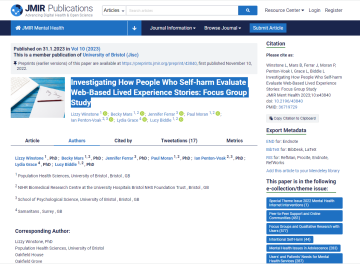Lived experience stories of self-harm may help and reduce stigma
- 7 February 2023
Lived experience stories of self-harm may be helpful for those with a history of self-harm but they should reflect a range of personal journeys to encourage relatability and avoid using stigmatising language. People with recent self-harm experience were able to positively engage with lived experiences stories found online, according to a study published in JMIR Mental health.
During the study, researchers led four online focus groups with 13 people who had recent experience of self-harm. Participants were asked to listen to three lived experience stories read out to them by a researcher. They were then asked to share their reactions to these stories. They were also asked to think and reflect on stories they’d previously come across on social media and the websites of healthcare or third sector organisations.
There are already clear guidelines for publishing self-harm related content safely such as avoiding graphic details which may feel triggering for some people. However, participants in this study noted the importance of a story feeling authentic and not overly sanitised in order to relate to it. Several participants suggested that inclusion of a nonlinear recovery journey, involving challenges and setbacks, helped make a story feel human and real.
Most participants described stories of recovery from self-harm as motivating and empowering. They felt hopeful and were inspired to believe that it might also be possible for them to recover by reading about how others had sought help.
They reported feeling less socially isolated after engaging with stories in the past. Engaging with the stories had also helped them understand their own feelings and behaviours better. Practical ideas for self-help strategies were described by most participants as particularly useful and some read accounts of lived experiences to distract from urges to self-harm.
Older participants found it challenging if they encountered a story where someone’s recovery was framed within a certain period or by a certain age. They felt that this could be demoralising and elicit unwanted comparisons between themselves and the person in the story. This could lead to feeling that they were ‘doomed’ or likely to experience self-harm ‘forever’.
Several participants reflected on the importance of lived experience stories not using language that stigmatises self-harm or alienates people who engage in it. They felt that using certain language could reinforce the sense that they were being judged and could feel devaluing for those experiencing self-harm.
The internet is an important source of support for people who self-harm, especially those who are unable or reluctant to access formal, in-person support. However, web-based support also carries with it risks, such as unintentional exposure to graphic content or engagement with discussion forums in which self-harm is sometimes normalised and negative feelings are reinforced.
Dr Lizzy Winstone, lead-author, said:
“Our findings have implications not only for organizations publishing lived experience content but also for community guidelines and moderators of web-based forums in which users share their stories.
“Issues such as age, relatability and perceived authenticity of someone’s journey came to the fore during our focus groups and should be carefully considered by anyone publishing this type of content.
“Stories should also avoid using stigmatizing language to prevent alienating readers and reinforcing negative feelings.”
Dr Becky Mars, co-author, said:
“Our findings suggest that lived experience stories can support readers to feel validated and help them to better understand their own feelings and experiences.
“Participants also told us that exposure to these stories can empower people to share their experiences with professionals and their support network. As such, they can not only promote help-seeking for people who self-harm but may also provide a helpful way of educating others about self-harm, which can reduce stigma.”
Dr Lucy Biddle, co-author, said:
“Lived experience stories are a frequently used source of information and support on the websites of third-sector or healthcare organisations and can include user-generated content on social media.
“Stories are often personal accounts of how someone got help and subsequently recovered.
“Our participants considered realistic representations about recovery being a nonlinear process helpful in terms of managing expectations and pressure about their own recovery.”
